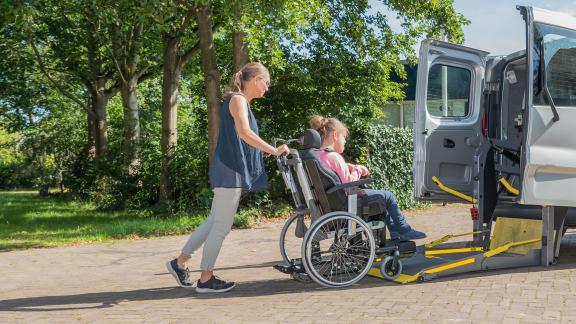One Devon: Devon ICS’ approach to integrating their workforce across the system

Devon Integrated Care System (ICS) established the One Devon partnership, a collaboration between the NHS, social care, local councils and voluntary communities, social enterprise sector and people who use services in the Devon community. The aim of this partnership is to assure that everyone in Devon has an equal chance to live long, healthy and happy lives. Prior to One Devon, the services across Devon were working in silos.
Key benefits and outcomes
One Devon is currently working on a series of projects to improve the health, wellbeing and care for local people and communities, this includes:
- Establishing a set of five principles relating to workforce that can be embedded across the whole system.
- Addressing future thinking with Health Education England (HEE) and the staff college to develop future scenarios that reflect what the system and workforce could look like in 2035.
- Establishing an integrated programme of work called LoveCare, which brings together both local and national partners to test, learn and develop local care systems and workforce within Devon.
What the ICS faced
In general, services across health and care work in silos, and the pandemic emphasised this further. Devon recognised if they worked collectively across the system to provide better patient care, great things could be achieved. Therefore, Devon created a team of people to lead this work around integration talking both nationally and locally across the system.
What the ICS did
Workforce strategy
One Devon is currently developing a workforce strategy, which will be the pillar of the ICS Devon approach to delivering the NHS people plan. The workforce strategy will focus on the future workforce models, skills and multi-professional expertise required to meet the population’s growing needs.
Principles
One Devon established five strategy themes and principles through extensive engagement. They connected with system leaders and stakeholders across health and social care, through this thematic feedback, recommendations from national white papers and ICS Devon ambitions, five key themes and principles emerged:
- System working Ambitions of integration, workforce flexibility and collaboration.
- Stability Ensuring a secure future staffing model that enables our workforce to flourish and succeed.
- Learning and education Informing the future skills and providing opportunities for training, career development and ongoing learning.
- Digital Enhancing technology and sharing best practice and innovation.
- Sustainability Cost-effectiveness and productivity.
Using these strategy principles, Devon’s stakeholders were asked how Devon can do things differently. They asked stakeholders to consider horizon scanning and future thinking, focusing on workforce models, pathways of care and sectors to reduce duplication, maximising workforce potential and improving the services and experiences for the community. The principles are aimed to drive and deliver action-orientated outputs across all sectors and the current and future workforce.
LoveCare
Devon ICS established a strategic workforce development programme of work called LoveCare. The programme focuses on key issues facing its workforce, and seeks to place the care of the workforce firmly into the centre of the ICS. It brings together local and national partners to test, learn and develop their local care system and workforce within Devon.
Devon ICS developed a prospectus for change in collaboration with those who are working on the front line, partners in the independent sector, education and skills providers, and wider local government. Through this prospectus, Devon is using its work to test and develop solutions that could have wider, national relevance and impact that include:
- influencing local, regional and national debate
- understanding and investing in the economic impact of adult social care
- developing education, skills and career pathways
- working to achieve fair pay and conditions
- achieving change through innovation.
As well as this, the system identified seven measures:
- reward
- recognition
- economy
- skills and career pathways development
- innovation
- digital and technology
- place-based workforce.
They are hoping that through these measures they will create a sufficient, caring, confident and collaborative workforce that will provide outstanding, person-centred, care.
Integration is a core principle of the LoveCare programme. Collectively across the system, Devon ICS is working to develop an integrated social care and health workforce strategy and plan, including career pathways and hybrid roles.
'A workforce with a shared ambition for health, wellbeing and independence can improve the delivery of shared outcomes. Integrated services can only be delivered by a capable, confident and collaborative workforce which works together [at place] to wrap care and support around individuals and feels valued for the work they do.’ Health and social care integration: joining up care for people, places and populations (White Paper) February 2022.
Future thinking
The ICS recognised that to drive transformation, innovation and identify intuitive workforce solutions, they needed to value and listen to the knowledge and expertise of those working closest to services, sectors, and communities.
Eight future-facing scenario workshops were developed in partnership with HEE and Staff College. The scenarios were built using real ICS Devon workforce trends and staff experiences. These scenarios immerse stakeholders in future thinking for what Devon’s health and the social care sector will look like in 2035. Using three horizon methods, business as usual, disruptive innovation and the emerging future, the workshops have provoked stakeholders to creatively consider aspirational transformation opportunities and doing things differently to meet the five principles of the workforce strategy. Over 250 delegates from across health and social care have been invited to take part in the workshops from clinical and non-clinical roles. Additionally, ten senior executive interviews have taken place using the seven questions for the future technique.
Key systems themes from the workshops and interviews were:
- Values based approaches
There was a great deal of commonality in how participants felt about the future, as described in the scenarios. They were clear about what they wanted - a more cohesive approach to health and wellbeing, effective and efficient ways of working, that actively reduce health inequalities. - Balance
People liked aspects of some of the scenarios, but often felt some ideas were taken to extremes. They wanted to see a balanced approach, on the whole. - Getting ahead with positive action
There was a sense that some of the most positive scenarios were extremely aspirational - and enormous change would be needed to achieve the successes described. - Change just to avoid disaster
There was also a sense that significant change would be needed to avoid the negative aspects in various scenarios. - A genuinely systems based approach - strategic level
Participants often explored changes needed across parts of the system and between strategy and delivery. In particular, there was a strong sense that decisions and coordination have to happen at a senior leadership level on some issues - so that different parts of the system are not working against each other. - Systems based approach - connecting strategy to delivery
Participants felt there is a need to connect high level ideas with leadership and implementation on the ground - this needs to be planned and a managed process of change. There is a gap to be bridged between high level ideas and principles and detailed planning for specific parts of the workforce or the system. - Scope of control
Often participants emphasised how workforce planning needs to be developed with other wider services - given the number of different services impacting on health and wellbeing. For example, housing services. There was sometimes a concern about the lack of control those involved would have, over issues such as national policy and practice - which some felt sure influenced the direction of travel. Others felt that national policy and practice wouldn’t necessarily need to change the direction of travel within the system. - Local versus centralised
Participants often had mixed feelings about some of the concepts in the scenarios that might mean there are specific hubs or places for delivery - there were concerns about rural patients having to travel, but also worries about people being isolated being at home.They felt that sometimes this would represent a very new direction of travel from the local and community based approaches they have been working towards in recent years. - Ethos and philosophy of responsibilities
Participants drew attention to the different tone of the scenarios, when it came to expectations of patients. The aspirational approach of self-care in one of the scenarios was welcomed - though some thought this was extremely aspirational. This was seen by some as unrealistic. There was at times a sense that this might exacerbate inequalities, as it relies on individual or family capacity and resources. Moving to a more data driven approach was very different in terms of ethos. They felt there was a need to consider the pros and cons of such big shifts, and a need to reach agreement on what was and wasn’t acceptable. - Careful consideration of unintended consequences of radical change
There were specific aspects of some scenarios, which at first seemed positive, but participants warned might not be as beneficial as they at first seem. For example, having local and regional hubs - it was felt that this could be a barrier to many people such as those in rural areas or without options for accessing and travelling. - Being realistic about expectations of others, or other parts of the system.
There was a strong sense that expectations need to be managed in relation to the responsibility people would take for themselves, even with the support of technology. If there are to be goals around personal responsibility that would go way beyond the workforce - and would need significant work outside the health and social care system to progress with this. There is a sense that people are already tired and out of energy in relation to transformation. - Work with a wide range of actors and systems
The scenarios led to discussions about the need for the wider system - around housing, education, and the economy - to change to enable many of the benefits in the scenarios to be realised, and many of the pitfalls to be avoided. It was felt that a wide range of actors need to be involved in workforce planning.
Results and benefits
Devon is still in the early development of workforce planning and workforce transformation. The output from the workshops and interviews will be used in a fifth scenario workshop to create a picture of how Devon’s workforce visualises the future of health and care in Devon. Work is being continued with staff college and HEE to develop and implement this and the current trajectory for this work is due to be analysed in March 2023.
They will be developing a template and self-assessment tool using themes from the workshops for stakeholders to complete. These resources will help inform future workforce aspirations and help identify where priorities are.
One of the key benefits of establishing one Devon has been the relationships built across systems. The power of getting people into the same room to have conversations about how they can work together has been transformational.
Devon is at the start of its journey and will continue to update the case study as more results and evaluation comes to light.
Overcoming obstacles
The operational pressures of the NHS have challenged engagement from stakeholders and consequently attendance at the workshops. On average there was a 60 per cent drop out rate in bookings. However, the quality of the conversations and the diversity of stakeholders across the scenarios have not been impacted.
The social care voice is not visibly strong across the different scenarios. This has been challenged by the sector NHS centric focus. However, some of this could have changed if the scenarios had been positioned slightly differently during the workshop delivery. Establishing strong champions and early adopters have been key in improving engagement.
Takeaway tips
- Create a multi-dimension engagement and communications strategy, a one-dimensional approach will not always generate diversity across a system.
- Use champions and early adopters to sell your vision across sectors that are harder to reach.
- Pause! Stop and evaluate to ensure the activity is generating meaningful data.
- Spend time building trust. Trust is a bedrock for collaboration and successful change. It makes everything after it so much easier, more enduring and with more chance of success
- Follow the energy: we are small, and the system is big and complex. Trying to change it is a huge task. But look for where the energy already is and follow that and use that. It’s a lot easier than pushing boulders up hill on your own.
- While the (shared) outcome is important….so is the (shared) journey. It is where we learn and learn to work together. Relationships are forged on journeys.
Contact information:
For more information contact Ian Hobbs, senior commissioning manager, integrated adult social care at Devon ICS via his PA julie.treleaven@devon.gov.uk.



